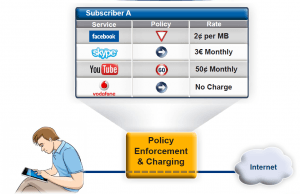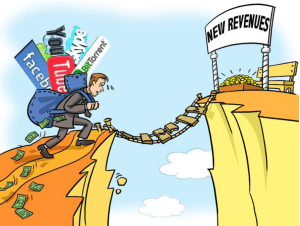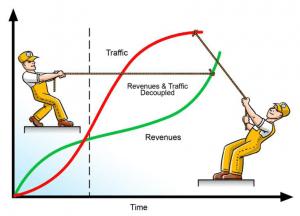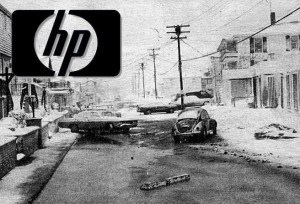
This slide, produced to sell "network management" equipment, is the best argument for Net Neutrality around.
Want to visit Facebook? That will be two cents per megabyte, please. Skype? You can get a real bargain this month — your ISP is only charging you $5 for an unlimited monthly permission pass. YouTube? All customers with a deluxe bundled broadband plan get a special discount — just 50 cents for up to 60 videos, this month only!
All of these charges, levied by your Internet Service Provider, are real world scenarios being sold by two equipment vendors — Allot Communications and Openet, for immediate use on Net Neutrality-free wireless broadband networks. Thanks to Stop the Cap! readers Lance and Damian for sending us the story.
Both companies are excited by the potential harvest of bountiful revenue — for themselves in selling the equipment that will carefully monitor what you do with your Internet connection and then control what kind of experience you get, and for providers who can finally bend the usage curve down while “finally” getting average revenue per customer shooting sky high once again.
In the webinar, run last Tuesday and moderated by Fierce Wireless, the two companies carefully divided their one hour presentation between the technological and financial benefits of “network management” technology. For every statement about how their bandwidth management system would improve the predictable responsiveness of the provider’s network, another comment followed, touting the enormous new revenue potential this technology will bring providers, all without costly network upgrades.

Poor provider. His stuffed pockets of profit are leaking your money paid to access websites you want to visit. But with Allot and Openet's products, the pot 'o gold is just a few steps away.
On Tuesday, the Federal Communications Commission will vote on a watered-down Net Neutrality proposal that would do nothing to prevent this nightmare scenario from becoming reality. The webinar and its accompanying slides couldn’t illustrate Net Neutrality-proponents’ arguments better:
1. Such technology requires providers to carefully track and monitor everything you do with your web connection, obliterating privacy and creating a potential data trail that could be exploited for just about anything. Indeed, Allot and Openet treat the data tracking feature as a benefit, opening the door to marketing campaigns to upsell your broadband connection or target upgrade offers based on your web history;
2. It’s all about the money. Allot and Openet see their products as a cost-saver for providers to control expenses by cutting speeds/access for heavy users to provide a more consistent service for others, reducing the urgency to upgrade networks. The companies also heavily focus on the revenue opportunities available from Internet Overcharging schemes;
3. The webinar includes a slide showing that providers can charge individual fees just to visit and utilize third party websites and applications, while letting providers deliver their own content, services and applications for free. Got a bothersome competitor? Just make a quick change with Allot’s product and your customers will face a withering admission fee in the amount you choose before they can even use the application;
4. The technology allows providers to wreak special havoc on peer-to-peer traffic, always the bane of traffic-conscious ISPs;
5. Want to extract more cash from an individual subscriber? Providers can custom-design packages based on web site habits, usage, speed, and even the time of day the person is most likely to use the web. Providers can then develop so many different usage packages, comparison shopping becomes meaningless. The price you pay may be different than what others on your street pay, and you may never know by how much or why.

These Big Telecom workmen are not hard at work upgrading networks to meet demand. They are wrangling an Internet Overcharging scheme to reduce your usage while charging you more. (All of these slides were produced by the vendors themselves.)
Public Knowledge legal director Harold Feld saw right through the slide show: “If you want the slide deck to show why we need the same rules for wireless and wireline, this is it.”
Listen to the audio portion of “Managing the Unmanageable: Monetizing and Controlling OTT Applications,” which does not include the slide show. (60 minutes)
You must remain on this page to hear the clip, or you can download the clip and listen later.
<
p style=”text-align: center;”>
Broadband advocates have been warning providers have been dreaming of this kind of pricing for a few years now.
“I have been saying that this is where they want to go for a while,” Barbara van Schewick wrote to Wired. “The IP Multimedia Subsystem (IMS), a technology that is being deployed in many wireline and wireless networks throughout the country, explicitly envisages this sort of pricing as one of the pricing schemes supported by IMS.”
Although the system described by the webinar is currently being sold for use on wireless networks, nothing prevents providers from adopting similar schemes on their wired networks, arguing their use is about “intelligent network management,” not content or pricing discrimination.
It’s a scenario likely to be tested soon, especially with FCC Chairman Julius Genachowski’s watered down Net Neutrality proposals. More than one observer believes the chairman has made a deal with the Big Telecom Devil: observe our watered down rules, don’t sue to have them thrown out, and the Commission will not invoke Title II and reinstate regulatory authority over broadband.
But as anyone who watches the broadband industry must realize by now, providers always break these deals. They will sue the moment a controversy erupts that is not in their favor, and they are very likely to win.


 Subscribe
Subscribe







